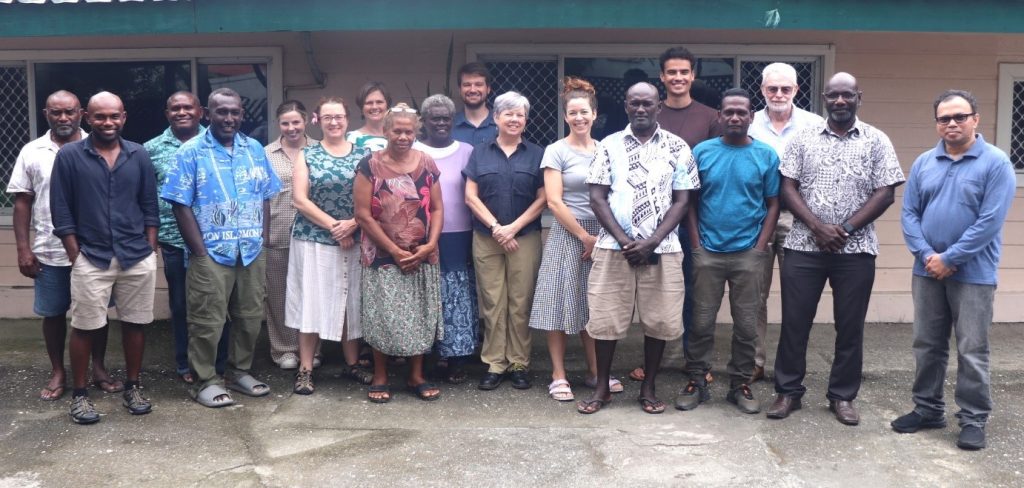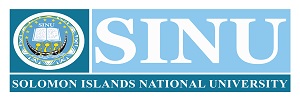𝐏𝐫𝐞𝐬𝐬 𝐑𝐞𝐥𝐞𝐚𝐬𝐞
𝟐𝟐 𝐀𝐩𝐫𝐢𝐥 𝟐𝟎𝟐𝟓

The Livelihood Forest Ecosystem Recovery (LIFER) research project—a six-year initiative focused on restoring degraded forest ecosystems and improving community livelihoods—is actively engaging with six communities in the Western Province of Solomon Islands.
Launched in November 2022, the project is supported by the Australian Centre for International Agricultural Research (ACIAR).
LIFER addresses the urgent need to rehabilitate forests that have been severely degraded by decades of unsustainable commercial logging—an industry that once contributed up to 70 percent of the country’s export income.
According to Forest Ecologist and Pro Vice-Chancellor (Academic) at the Solomon Islands National University (SINU), Associate Professor Eric Katovai, repeated high-impact logging has disrupted the natural regeneration of native forests, significantly affecting biodiversity, forest structure, and essential ecological functions.
“Logging at unsustainable levels has not only altered the ability of forests to recover naturally, but it has also reduced the availability of essential forest resources such as food, traditional medicine, and building materials,” said Associate Professor Katovai.
“These losses directly impact rural livelihoods, where communities rely heavily on forests for their daily needs and income,” he added.
Currently, LIFER is working with three communities on Kolombangara, two on Rendova, and one on New Georgia.
In a country where approximately 90 percent of the population depends on forest resources, the project aims to accelerate forest recovery using adaptable, community-driven restoration methods. It also seeks to promote inclusive forest governance and strengthen local participation in sustainable resource management.
The LIFER research project is a collaborative effort led by academic researchers from Queensland University of Technology, Griffith University, the University of Melbourne, the University of Adelaide, and Solomon Islands National University.
The project also works in close partnership with local NGOs—including Ecological Solutions Solomon Islands, Landscape Sustainable Solutions, and other community-based organizations—who are the key implementing partners. In addition, LIFER collaborates with relevant government ministries to ensure alignment with national development priorities and environmental policies.
According to Professor Helen Wallace, LIFER Project Leader and Head of the School of Biology and Environmental Science at Queensland University of Technology, the project will trial four forest restoration treatments across the participating communities: Control (no intervention), Assisted Natural Regeneration, Enrichment Planting, and Agroforestry. These methods are designed to determine the most effective and sustainable approaches for restoring degraded forest landscapes in the Solomon Islands context.
Professor Wallace emphasized that capacity-building is a central component of the project. Community members—particularly women and youth—will be receiving livelihood trainings to assist communities sustainably manage the use of their natural forest resources while allowing post-logging forest ecosystem recovery to take its course.
In addition to on-the-ground interventions, LIFER integrates scientific and social assessments to evaluate the success of each restoration method. These include biodiversity monitoring, water quality assessments, and carbon sequestration studies to track the recovery of ecosystem services. Economic analyses will compare the costs and benefits of different strategies, generating data to inform national forest restoration planning and providing replicable models for other Pacific Island nations facing similar deforestation challenges.
As part of its commitment to building long-term local research capacity, the LIFER project will soon support three PhD students, including Mr Kabini Afia, a Solomon Islander who recently completed his Master’s by Research at SINU and is awaiting graduation in September.
Mr. Kabini will pursue his PhD at Griffith University in Australia, focusing on the social aspects of community engagement in forest restoration. Additionally, LIFER is in the process of finalising two Master’s by Research scholarships for two aspiring local ecologists to undertake studies at Solomon Islands National University, further strengthening national expertise in forest ecology and environmental sciences.
According to Associate Professor Leah Burns of Griffith University, who leads LIFER’s Social Science Team, the project’s long-term vision is to establish scalable, community-led forest restoration efforts throughout the Solomon Islands. She noted that by fostering inclusive, bottom-up approaches to resource governance, LIFER empowers communities—especially women and youth—to take active roles in the stewardship and sustainable management of their forests.
The project also aims to develop best-practice restoration protocols and contribute to both regional and global knowledge on sustainable forest management. By combining scientific research with community leadership, LIFER is laying the foundation for a more resilient and self-reliant future for forest-dependent communities in the Solomon Islands.
End/////////////////////
